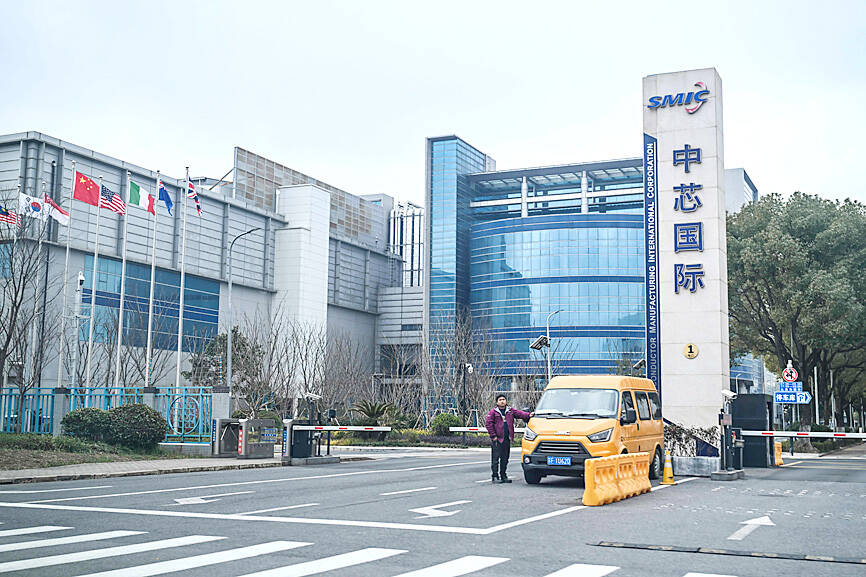Chinese chipmaker Semiconductor Manufacturing International Corp (SMIC, 中芯) “potentially” broke US law if it manufactured a processor for sanctioned telecom giant Huawei Technologies Co (華為), a senior US official said on Thursday.
US Undersecretary of Commerce for Industry and Security Alan Estevez was questioned about the 7-nanometer processor that SMIC made for Huawei during testimony before US lawmakers. When asked by US House of Representatives Foreign Affairs Committee Chairman Michael McCaul whether SMIC violated US controls, Estevez said “potentially, yes.”
The Chinese chipmaker’s shares slid as much as 5.5 percent in Hong Kong, its biggest intraday drop in about a month.

Photo: AFP
“We’ll assume that it was SMIC,” Estevez said. “I can’t talk about any investigations that may or may not be going, but we certainly share those concerns, and that’s certainly the reporting.”
Estevez described SMIC’s manufacturing process as “low-yield,” repeating past comments from commerce officials questioning China’s ability to produce advanced chips at scale and at a consistent performance threshold.
Estevez heads the agency’s Bureau of Industry and Security, which is responsible for chip export controls and sanctions that the administration if US President Joe Biden hopes will kneecap China’s semiconductor ambitions. Biden has introduced sweeping restrictions on the ability of Chinese companies to purchase advanced chips and chipmaking gear from US firms, and persuaded key allies including the Netherlands and Japan to introduce their own curbs.
Despite those efforts, Shenzhen, China-based Huawei managed to debut an advanced 7-nanometer chip in a smartphone that went on sale while US Secretary of Commerce Gina Raimondo was visiting China in August last year. The chip in Huawei’s Mate 60 device was manufactured by SMIC but relied heavily on technology from Dutch equipment giant ASML Holding NV and US gear makers including Lam Research Corp and Applied Materials Inc.
That equipment was exported to China before US and Dutch curbs limiting such transactions went into effect, Bloomberg News has reported.
“They did access tools before we put in our tool controls — not the highest-end tools, but the level just below that,” Estevez said. “Those tools will ossify over time and that process will be degraded.”
The US Bureau of Industry and Security in September last year said that it is probing the “purported” 7-nanometer chip, and Raimondo has vowed the “strongest possible” action to protect US national security.
The Biden administration is considering sanctioning Huawei’s secretive network of potential chipmaking partners, as well as a couple of firms officials say could purchase restricted equipment and sell it to the telecom giant.
US officials are also pushing their Dutch and Japanese counterparts to tighten their chip controls — and trying to persuade Germany and South Korea to join the arrangement, particularly to stem the flow of spare parts from those countries to China.

Real estate agent and property developer JSL Construction & Development Co (愛山林) led the average compensation rankings among companies listed on the Taiwan Stock Exchange (TWSE) last year, while contract chipmaker Taiwan Semiconductor Manufacturing Co (TSMC, 台積電) finished 14th. JSL Construction paid its employees total average compensation of NT$4.78 million (US$159,701), down 13.5 percent from a year earlier, but still ahead of the most profitable listed tech giants, including TSMC, TWSE data showed. Last year, the average compensation (which includes salary, overtime, bonuses and allowances) paid by TSMC rose 21.6 percent to reach about NT$3.33 million, lifting its ranking by 10 notches

Popular vape brands such as Geek Bar might get more expensive in the US — if you can find them at all. Shipments of vapes from China to the US ground to a near halt last month from a year ago, official data showed, hit by US President Donald Trump’s tariffs and a crackdown on unauthorized e-cigarettes in the world’s biggest market for smoking alternatives. That includes Geek Bar, a brand of flavored vapes that is not authorized to sell in the US, but which had been widely available due to porous import controls. One retailer, who asked not to be named, because

SEASONAL WEAKNESS: The combined revenue of the top 10 foundries fell 5.4%, but rush orders and China’s subsidies partially offset slowing demand Taiwan Semiconductor Manufacturing Co (TSMC, 台積電) further solidified its dominance in the global wafer foundry business in the first quarter of this year, remaining far ahead of its closest rival, Samsung Electronics Co, TrendForce Corp (集邦科技) said yesterday. TSMC posted US$25.52 billion in sales in the January-to-March period, down 5 percent from the previous quarter, but its market share rose from 67.1 percent the previous quarter to 67.6 percent, TrendForce said in a report. While smartphone-related wafer shipments declined in the first quarter due to seasonal factors, solid demand for artificial intelligence (AI) and high-performance computing (HPC) devices and urgent TV-related orders

MINERAL DIPLOMACY: The Chinese commerce ministry said it approved applications for the export of rare earths in a move that could help ease US-China trade tensions Chinese Vice Premier He Lifeng (何立峰) is today to meet a US delegation for talks in the UK, Beijing announced on Saturday amid a fragile truce in the trade dispute between the two powers. He is to visit the UK from yesterday to Friday at the invitation of the British government, the Chinese Ministry of Foreign Affairs said in a statement. He and US representatives are to cochair the first meeting of the US-China economic and trade consultation mechanism, it said. US President Donald Trump on Friday announced that a new round of trade talks with China would start in London beginning today,